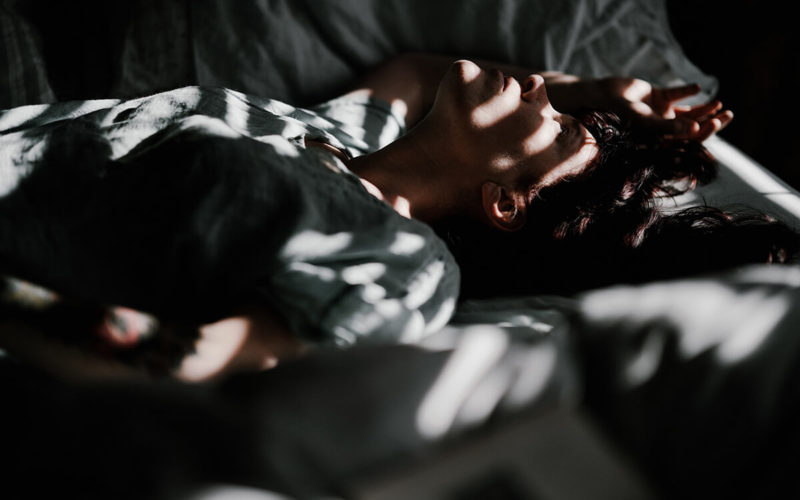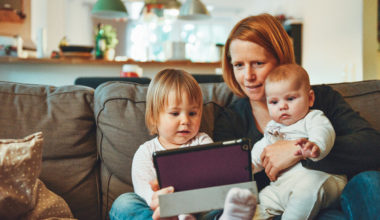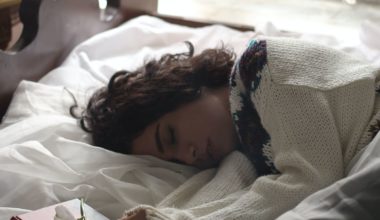Updated 3/28/2022
Sleeping well when you’re stressed can be tough. Sleeping well when you’re stressed due to the pandemic can feel impossible. If you’re experiencing insomnia symptoms due to the COVID-19 global pandemic, you’re not alone. Many people have reported sleep disorders since the beginning of COVID. In fact, it’s become so prevalent, there’s now even a name for this phenomenon — “COVIDsomnia” or “coronasomnia.”
Here, we’re taking a deep dive into what COVID insomnia, or COVIDsomnia, actually is. We’re looking at how it’s related to anxiety and stress, and discussing some possible long-term effects if insomnia is left unaddressed. Finally, we’re sharing several holistic methods you can begin using today to better manage your COVID-related insomnia.
What is “Covidsomnia?”
Insomnia is a common sleep disorder that makes it difficult to fall or stay asleep. It often causes people to wake up in the middle of the night, not be able to fall back to sleep, and have sleep deprivation which can interfere with your ability to function.
COVIDsomnia is a bit more complex than basic insomnia. It has the typical stress-related sleep disorder symptoms of insomnia, but we also must look at the anxiety symptoms that are associated with stressors that have evolved since the onset of the virus.
While it’s true that any type of stress can cause sleep deprivation, the anxiety and stress we’re seeing as a result of the coronavirus pandemic is unprecedented. The many changes to daily life we’ve faced as a result of COVID are compounding and adding to already high-stress levels. Some reasons as to what causes anxiety and stress in our life might include:
- Mask-wearing
- Adjusting to work-from-home
- Navigating new parental challenges
- Misinformation
- Changing guidelines
- Managing new school guidelines
- Going back to work
Additionally, many people today are also experiencing more stress in their life simply because they’re afraid of getting COVID-19 or because they’re having a tough time post-recovery.
“Covidsomnia can come from the fear of getting Covid, stress related to the collective anxiety, or as a possible symptom of long Covid.”
Statistics show that global search inquiries for insomnia-related topics increased by a whopping 58% during the first five months of 2020. This sharp global incline in the interest of insomnia disorder serves as a pretty solid defense for the need for a term like: covidsomnia.
What Causes Insomnia from the Pandemic?
COVID and insomnia are now often associated, and the two conditions seem to be related to many people who become infected. The question then becomes, has the pandemic actually caused insomnia, or is sleep difficulty a symptom of the stress and anxiety caused by the pandemic? Research done early on in the pandemic showed “very high” rates when looking at insomnia, anxiety, acute stress, and depression. Anxiety-related sleep disturbance issues have become so common that some experts are even saying COVID has caused a secondary pandemic, insomnia disorder.
“Anxiety is usually caused by the fear of the future. What if this happens—then what? Our mind can also think of the worst case scenario, which is indicative of anxiety. This overthinking can disrupt our natural sleep cycle.”
Is insomnia a symptom of COVID-19?
According to the Centers for Disease Control & Prevention (CDC) insomnia isn’t a direct symptom of COVID. However, insomnia can be triggered by any source of anxiety or stress, and the pandemic has certainly caused stress and anxiety symptoms for most of us. Also noteworthy is the fact that within just the first few weeks of the national shut down in early 2020, sleep medicine prescriptions went up by nearly 15%.
When we’re connecting this uptick and trying to answer the question: does COVID cause insomnia, the data certainly indicates there could be a strong correlation between the pandemic and insomnia symptoms. However, it’s important to note that the sleep disorder has not been formally labeled as a COVID-19 symptom.
How Insomnia Impacts Your Mental Health
Much research has shown that getting proper rest is important for our mental health. In fact, it’s estimated that nearly half of all insomnia cases are related to anxiety, depression, or stress. It’s the most commonly reported sleep disorder known to be associated with anxiety disorders. It follows, then, that chronic insomnia can have a serious negative impact on mental health.
“Research has shown that sleep is very important for our mental health. Sleep provides a recalibration of the nervous system and allows a ‘refresh button’ when the brain emits delta waves. Delta wave frequencies occur when we are in deep sleep.”
- Memory and focus: Poor sleep can contribute to worsened memory, inability to focus, and generally inefficient cognitive function.
- Weakened immune system: Sleep difficulty can have a severe impact on our body’s ability to stay healthy, which is extremely relevant when we’re looking at COVID-19. Immunity matters, and if we have poor sleep, our immune systems can function sluggishly, leaving us more susceptible to viral, fungal, or bacterial sickness.
- Mood and emotions: Post COVID insomnia may also adversely affect our mood and emotions. This can be intensified when we’re stressed out, especially given the additional stress we may experience if we’re worried about things like coming out of a global pandemic.
- Bodily harm: Chronic insomnia can actually cause bodily harm as well. It can exacerbate metabolic and cardiovascular conditions and neurocognitive morbidity.
- Mental health: Finally, beyond the points we’ve already discussed in relation to insomnia and mental health, when we experience sleep issues regularly, our risk increases for depression, anxiety, and substance and alcohol abuse.
How to Overcome Insomnia from COVID-19
Overcoming insomnia with COVID anxiety can be challenging, but it is possible. There are several natural and safe methods for how to treat anxiety and stress from the pandemic, which can, in turn, enhance sleep.
Consider some or all of the following ways to reduce your stress and relax before bedtime so you can get a better night’s rest.
Allow your mind to relax before bedtime
We’re constantly bombarded by the news today. It likely feels like you can’t escape all the platforms and sources of information that are literally at your fingertips. Everywhere you turn, there’s more (these days, it seems bad) news. This consistent inundation of information is a leading source of stress and anxiety associated with COVID-19.
With all the negativity and reminders about the pandemic everywhere we look — both on television and online — it’s natural to feel increased anxiety that can cause insomnia. Avoiding this before bedtime and allowing your mind some time to relax can definitely be the simple destresser you’ve been searching for.
If you want to sleep better at night, consider shutting down early. Getting less screen time for a couple of hours before you try to go to bed might just do wonders. The news will still be there in the morning.
Avoid napping during the day
Many people started working from home because of the pandemic. For some, though, being at home during the daytime makes it tempting to take a nap, especially if you’re not sleeping well at night. If you’re struggling to fall asleep or falling short of the recommended 7-9 hours of sleep per night, try to avoid napping.
It’s better to stick to a sleep schedule, waking and sleeping at the same times each day. Forgoing a nap during the day can help your body and brain be more tired at night.
Other ways to optimize your sleep schedule to avoid feeling like you need a midday nap are:
- Avoiding caffeine after 2pm
- Getting exercise during the day
- Create a peaceful sleeping environment
Consider Natural Ways to Enhance Your Sleep
Melatonin is a hormone our body produces in response to darkness. It helps regulate the circadian rhythm that dictates our sleep cycle. Lab-made versions of melatonin are known to improve sleep quality in many people. Additionally, magnesium is a nutrient that research has shown can help with symptoms of insomnia. Melatonin and magnesium are safe, natural substances that, when taken as directed for short periods of time, have no known adverse side effects. These supplements might help you rest more peacefully, even with anxiety caused by COVID-19. Consult your doctor before adding any of these supplements to your diet.
Meditation may also increase melatonin levels naturally. Meditation can help calm the mind and body to enhance your sleep. PRacticing deep meditation can also regulate cortisol and catecholamine levels.
Consider talk therapy
Psychotherapy techniques like cognitive behavioral therapy (CBT) can be very effective for managing anxiety and reducing the symptoms of insomnia. A skilled therapist through in-person or online therapy can teach you mindfulness and relaxation techniques to help you achieve more restful sleep and overcome COVID insomnia.
Get more information about your symptoms with our insomnia test. You deserve a good night’s sleep every night. We can help make sure you have the tools you need to get it.
Sources:
1 .Bartholomew, R. E., & Victor, J. S. (2004). A Social-Psychological Theory of Collective Anxiety Attacks: The “Mad Gasser” Reexamined. The Sociological Quarterly, 45(2), 229–248. http://www.jstor.org/stable/4121171. Accessed February 18, 2022.
2. Zitting K, Lammers-van der Holst H, Yuan R, Wang W, Quan S, Duffy J. Google Trends reveals increases in internet searches for insomnia during the 2019 coronavirus disease (COVID-19) global pandemic. Journal of Clinical Sleep Medicine. 2021;17(2):177-184. doi:10.5664/jcsm.8810. https://jcsm.aasm.org/doi/10.5664/jcsm.8810. Accessed February 18, 2022.
3. Berg, MS S. What doctors wish patients knew about post-COVID anxiety. American Medical Association. https://www.ama-assn.org/delivering-care/public-health/what-doctors-wish-patients-knew-about-post-covid-anxiety#:~:text=%E2%80%9CSome%20experts%20say%20the,of%20normal%20routines.%E2%80%9D. Published 2021. Accessed February 18, 2022.
4. Morin C, Carrier J. The acute effects of the COVID-19 pandemic on insomnia and psychological symptoms. Sleep Med. 2021;77:346-347. doi:10.1016/j.sleep.2020.06.005. https://www.ncbi.nlm.nih.gov/pmc/articles/PMC7274952/. Accessed February 18, 2022.
5. COVID-19 and Your Health – Post-COVID Conditions. Centers for Disease Control and Prevention. https://www.cdc.gov/coronavirus/2019-ncov/long-term-effects/index.html#:~:text=Similar%20to%20the%20symptoms%20seen,and%20joint%20pain%2C%20and%20cough. Published 2021. Accessed February
6. AMERICA’S STATE OF MIND U.S. trends in medication use for depression, anxiety and insomnia. AN EXPRESS SCRIPTS REPORT. https://corporate-site-labs-prod.s3.us-east-2.amazonaws.com/2020-04/Express%20Scripts%20America%27s%20State%20of%20Mind%20Report%20April%202020%20FINAL_1.pdf?utm_source=healthu. Published 2022. Accessed February 18, 2022.
7. Sleep Disorders | NAMI: National Alliance on Mental Illness. Nami.org. https://www.nami.org/About-Mental-Illness/Common-with-Mental-Illness/Sleep-Disorders. Published 2022. Accessed February 18, 2022.
8. Khurshid KA. Comorbid Insomnia and Psychiatric Disorders: An Update. Innov Clin Neurosci. 2018;15(3-4):28-32. https://www.ncbi.nlm.nih.gov/pmc/articles/PMC5906087/. Accessed February 18, 2022.
9. Fernandez-Mendoza J, Vgontzas A. Insomnia and its Impact on Physical and Mental Health. Curr Psychiatry Rep. 2013;15(12). doi:10.1007/s11920-013-0418-8. https://pubmed.ncbi.nlm.nih.gov/24189774/#:~:text=Based%20on%20findings%20that%20insomnia,phenotype%20is%20associated%20with%20a. Accessed February 18, 2022.
10. Melatonin: What You Need To Know. The National Institutes of Health. https://www.nccih.nih.gov/health/melatonin-what-you-need-to-know. Published 2021. Accessed February 18, 2022.
11. Meadows, A. (2022, March 11). Using magnesium for better sleep. Sleep Foundation. Retrieved March 21, 2022, from https://www.sleepfoundation.org/magnesium. Accessed March 21, 2022
12. Nagendra, R. P., Maruthai, N., & Kutty, B. M. (2012). Meditation and its regulatory role on sleep. Frontiers in neurology, 3, 54. https://doi.org/10.3389/fneur.2012.00054. Accessed March 21, 2022.
Talkspace articles are written by experienced mental health-wellness contributors; they are grounded in scientific research and evidence-based practices. Articles are extensively reviewed by our team of clinical experts (therapists and psychiatrists of various specialties) to ensure content is accurate and on par with current industry standards.
Our goal at Talkspace is to provide the most up-to-date, valuable, and objective information on mental health-related topics in order to help readers make informed decisions.
Articles contain trusted third-party sources that are either directly linked to in the text or listed at the bottom to take readers directly to the source.




